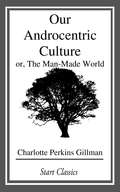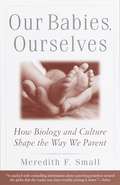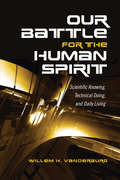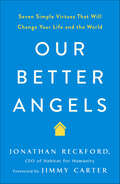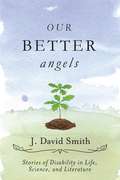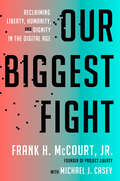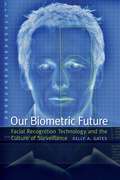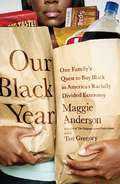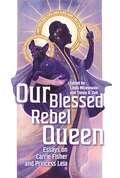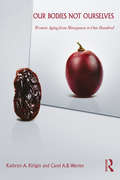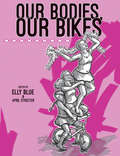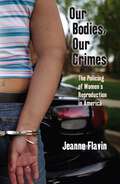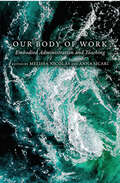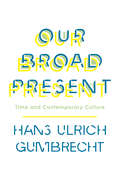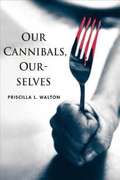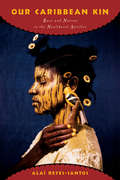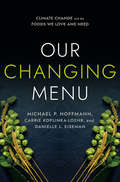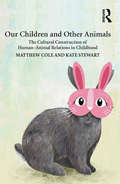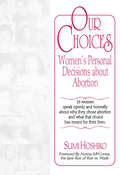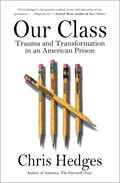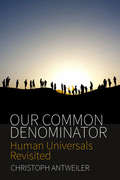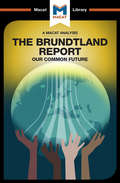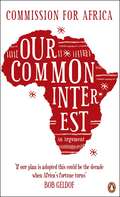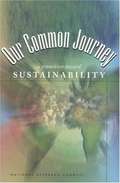- Table View
- List View
Our Androcentric Culture: or, The Man-Made World
by Charlotte Perkins GillmanA liberal feminist text. Rather than considering what is appropriate masculine or feminine behaviour, we should investigate what it is to be human.
Our Babies, Ourselves: How Biology and Culture Shape the Way We Parent
by Meredith SmallNew parents are faced with innumerable decisions to make regarding the best way to care for their baby, and, naturally, they often turn for guidance to friends and family members who have already raised children. But as scientists are discovering, much of the trusted advice that has been passed down through generations needs to be carefully reexamined.A thought-provoking combination of practical parenting information and scientific analysis, Our Babies, Ourselves is the first book to explore why we raise our children the way we do--and to suggest that we reconsider our culture's traditional views on parenting.In this ground-breaking book, anthropologist Meredith Small reveals her remarkable findings in the new science of ethnopediatrics. Professor Small joins pediatricians, child-development researchers, and anthropologists across the country who are studying to what extent the way we parent our infants is based on biological needs and to what extent it is based on culture--and how sometimes what is culturally dictated may not be what's best for babies.Should an infant be encouraged to sleep alone? Is breast-feeding better than bottle-feeding, or is that just a myth of the nineties? How much time should pass before a mother picks up her crying infant? And how important is it really to a baby's development to talk and sing to him or her?These are but a few of the important questions Small addresses, and the answers not only are surprising but may even change the way we raise our children.From the Trade Paperback edition.
Our Battle for the Human Spirit: Scientific Knowing, Technical Doing, and Daily Living
by Willem H. VanderburgWestern society has become saturated with scientific and technological modes of thinking that impact our lives and our relationships. Expanding social inequality, the use of social media and the rise of mental illnesses such as anxiety and depression are manifestations of this shift in our civilization.Our Battle for the Human Spirit is a comprehensive probe into what is happening to human life in the beginning of the 21st century. It explores how culture, experience, and symbolization have been replaced by scientific, discipline-based, approaches. Willem H. Vanderburg argues that these approaches are inadequate in understanding the complexity of human lives and societies. In order to transcend these limits, Vanderburg calls for the reintegration of culture and symbolization into our daily lives.
Our Better Angels: Seven Simple Virtues That Will Change Your Life and the World
by Jonathan ReckfordInspiring and insightful, Our Better Angels: Seven Simple Virtues That Will Change Your Life and the World celebrates the shared principles that unite and enable us to overcome life’s challenges together.“When the waters rise, so do our better angels.”—President Jimmy CarterJonathan Reckford, the CEO of Habitat for Humanity, has seen time and again the powerful benefits that arise when people from all walks of life work together to help one another. In this uplifting book, he shares true stories of people involved with Habitat as volunteers and future homeowners who embody seven timeless virtues—kindness, community, empowerment, joy, respect, generosity, and service—and shows how we can all practice these to improve the quality of our own lives as well as those around us.A Vietnam veteran finds peace where he was once engaged in war. An impoverished single mother offers her family’s time and energy to enrich their neighbors’ lives. A Zambian family of nine living in a makeshift tent makes room to shelter even more. A teenager grieving for his mother honors her love and memory by ensuring other people have a place to call home. A former president of the United States leads by example with a determined work ethic that motivates everyone around him to be the best version of themselves.These stories, and many others, illustrate how virtues become values, how cooperation becomes connection, and how even the smallest act of compassion can encourage actions that transform the world around us. Here are tales that will make readers laugh and cry and embrace with passion the calling of our better angels to change the way we take care of ourselves, our families, our communities, and the world.
Our Better Angels: Stories of Disability in Life, Science, and Literature
by J David SmithDo children and adults with disabilities enrich our lives? Far more than most people imagine.Our Better Angels is a testament to the value of individuals with disabilities and the value that society could derive from being more welcoming to and inclusive of them. The reward is the powerful humanizing influence that they can have on others-even some of the most hardened people among us.Colorful, real-life examples illustrate how a disability can be a valuable human attribute, a powerful source of compassion from which everyone can benefit.What are the challenges that face us as we strive for a more inclusive society? What are the values that should guide us in our efforts? Smith approaches these questions by examining his own experience and other unique perspectives: Meet the children and adults with disabilities who have touched his own life Consider what science-and pseudoscience-has said about disability View disability through the lens of history and literatureThe result is a compelling case for understanding and celebrating human diversity. Smith asks us to summon the "better angels" of our character and affirm our commitment to a society based on equality and democracy.
Our Biggest Fight: Reclaiming Liberty, Humanity, and Dignity in the Digital Age
by Frank H. McCourtThe internet as we know it is broken. Here&’s how we can seize back control of our lives from the corporate algorithms and create a better internet—before it&’s too late.&“In the spirit of Thomas Paine&’s Revolution-era Common Sense, this manifesto challenges us to create new digital architectures to safeguard democracy.&”—Walter Isaacson, #1 New York Times bestselling author of Elon MuskIt was once a utopian dream. But today&’s internet, despite its conveniences and connectivity, is the primary cause of a pervasive unease that has taken hold in the U.S. and other democratic societies. It&’s why youth suicide rates are rising, why politics has become toxic, and why our most important institutions are faltering. Information is the lifeblood of any society, and our current system for distributing it is corrupted at its heart. Everything comes down to our ability to communicate openly and trustfully with each other. But, thanks to the dominant digital platforms and the ways they distort human behavior, we have lost that ability—while, at the same time, we&’ve been robbed of the data that is rightfully ours.The roots of this crisis, argue Frank McCourt and Michael Casey, lie in the prevailing order of the internet. In plain but forceful language, the authors—a civic entrepreneur and an acclaimed journalist—show how a centralized system controlled by a small group of for-profit entities has set this catastrophe in motion and eroded our personhood. And then they describe a groundbreaking solution to reclaim it: rather than superficial, patchwork regulations, we must reimagine the very architecture of the internet. The resulting &“third-generation internet&” would replace the status quo with a new model marked by digital property rights, autonomy, and ownership.Inspired by historical calls to action like Thomas Paine&’s Common Sense, Our Biggest Fight argues that we must act now to embed the core values of a free, democratic society in the internet of tomorrow. Do it right and we will finally, properly, unlock its immense potential.
Our Biometric Future: Facial Recognition Technology and the Culture of Surveillance (Critical Cultural Communication #2)
by Kelly GatesSince the 1960s, a significant effort has been underway to program computers to “see” the human face—to develop automated systems for identifying faces and distinguishing them from one another—commonly known as Facial Recognition Technology. While computer scientists are developing FRT in order to design more intelligent and interactive machines, businesses and states agencies view the technology as uniquely suited for “smart” surveillance—systems that automate the labor of monitoring in order to increase their efficacy and spread their reach.Tracking this technological pursuit, Our Biometric Future identifies FRT as a prime example of the failed technocratic approach to governance, where new technologies are pursued as shortsighted solutions to complex social problems. Culling news stories, press releases, policy statements, PR kits and other materials, Kelly Gates provides evidence that, instead of providing more security for more people, the pursuit of FRT is being driven by the priorities of corporations, law enforcement and state security agencies, all convinced of the technology’s necessity and unhindered by its complicated and potentially destructive social consequences. By focusing on the politics of developing and deploying these technologies, Our Biometric Future argues not for the inevitability of a particular technological future, but for its profound contingency and contestability.
Our Black Year: One Family's Quest to Buy Black in America's Racially Divided Economy
by Maggie AndersonMaggie and John Anderson were successful African American professionals raising two daughters in a tony suburb of Chicago. But they felt uneasy over their good fortune. Most African Americans live in economically starved neighborhoods. Black wealth is about one tenth of white wealth, and black businesses lag behind businesses of all other racial groups in every measure of success. One problem is that black consumers--unlike consumers of other ethnicities-- choose not to support black-owned businesses. At the same time, most of the businesses in their communities are owned by outsiders. On January 1, 2009 the Andersons embarked on a year-long public pledge to "buy black. " They thought that by taking a stand, the black community would be mobilized to exert its economic might. They thought that by exposing the issues, Americans of all races would see that economically empowering black neighborhoods benefits society as a whole. Instead, blacks refused to support their own, and others condemned their experiment. Drawing on economic research and social history as well as her personal story, Maggie Anderson shows why the black economy continues to suffer and issues a call to action to all of us to do our part to reverse this trend.
Our Blessed Rebel Queen: Essays on Carrie Fisher and Princess Leia (Contemporary Approaches to Film and Media Series)
by Linda Mizejewski Ken Feil Kristen Anderson Wagner Jennifer M. Fogel Cynthia A. Hoffner Maghan Molloy Jackson Philipp Dominik Keidl Andrew Kemp-Wilcox Slade Kinnecott Sejung Park Tanya D. ZukOur Blessed Rebel Queen: Essays on Carrie Fisher and Princess Leia is the first full-length exploration of Carrie Fisher’s career as actress, writer, and advocate. Fisher’s entangled relationship with the iconic Princess Leia is a focal point of this volume. Editors Linda Mizejewski and Tanya D. Zuk have assembled a collection that engages with the multiple interfaces between Fisher’s most famous character and her other life-giving work. The contributors offer insights into Fisher as science-fiction idol, author, feminist inspiration, and Lucasfilm commodity. Jennifer M. Fogel examines the thorny "ownership" of Fisher’s image as a conflation of fan nostalgia, merchandise commodity, and eventually, feminist icon. Philipp Dominik Keidl looks at how Carrie Fisher and her iconic character are positioned within the male-centric history of Star Wars. Andrew Kemp-Wilcox researches the 2016 controversy over a virtual Princess Leia that emerged after Carrie Fisher’s death. Tanya D. Zuk investigates the use of Princess Leia and Carrie images during the Women’s March as memetic reconfigurations of historical propaganda to leverage political and fannish ideological positions. Linda Mizejewski explores Carrie Fisher’s autobiographical writing, while Ken Feil takes a look at Fisher’s playful blurring of truth and fiction in her screenplays. Kristen Anderson Wagner identifies Fisher’s use of humor and anger to challenge public expectations for older actresses. Cynthia Hoffner and Sejung Park highlight Fisher’s mental health advocacy, and Slade Kinnecott personalizes how Fisher’s candidness and guidance about mental health were especially cherished by those who lacked a support system in their own lives. Our Blessed Rebel Queen is distinct in its interdisciplinary approach, drawing from a variety of methodologies and theoretical frameworks. Longtime fans of Carrie Fisher and her body of work will welcome this smart and thoughtful tribute to a multimedia legend.
Our Bodies Not Ourselves: WOMEN AGING FROM MENOPAUSE TO ONE HUNDRED
by Kathryn A. Kirigin Carol A.B. WarrenIn 1970, the best-seller Our Bodies Ourselves was published. The focus of the authors, the Boston Health Collective, was on the youthful female body: on reproduction, sexuality, genitalia, intimacy and relationships in the context of North American cultural expectations. Our Bodies Not Ourselves is also about the female body—but on women aging from menopause to 100. Like its predecessor, Our Bodies Not Ourselves covers sexuality, genitalia, intimacy, gender norms and relationships. But the aging woman's body has many other issues, from head to toe, from skeleton to skin, and from sleep to motion. The book, an ethnography and Western cultural history of aging and gender, draws upon history, culture and social media, the authors’ own experiences as women of 70, and conversations and correspondence with more than two hundred women aged from 60-ish to 100. They consider the cultural and structural frameworks for contemporary aging: the long sweep of history, gendered cultural norms and the vast commercial and medical marketplaces for maintaining and altering the aging body. Part I, The Private Body, focuses on the embodied experiences of aging within our private households. Part II, The Public Body, explores weight, height, and adornment as old women appear among others. Part III, The Body With Others, sets the embodied experiences of aging women within their sexual and social relationships.
Our Bodies, Our Bikes (Bicycle Ser.)
by Various AuthorsThis book collects many voices, mostly women, talking about and illustrating their experience at the intersection of bicycling and gender. None of us are doctors and we don't intend to give you medical advice. Likewise, we don't advocate doing anything that isn't legal where you are or safe by your own judgement. Please enjoy the book and go out and do what's right for you.
Our Bodies, Our Crimes: The Policing of Women’s Reproduction in America (Alternative Criminology #16)
by Jeanne FlavinWinner of the 2010 Distinguished Book Award from the American Sociological Association; Sex and Gender Section2009 Choice Outstanding Academic TitleAn important work documenting how the criminal justice system polices women's reproductive capacityThe intense policing of women’s reproductive capacity places women’s health and human rights in great peril. Poor women are pressured to undergo sterilization. Women addicted to illicit drugs risk arrest for carrying their pregnancies to term. Courts, child welfare, and law enforcement agencies fail to recognize the efforts of battered and incarcerated women to care for their children. Pregnant inmates are subject to inhumane practices such as shackling during labor and poor prenatal care. And decades after Roe, the criminalization of certain procedures and regulation of abortion providers still obstruct women’s access to safe and private abortions.In this important work, Jeanne Flavin looks beyond abortion to document how the law and the criminal justice system police women’s rights to conceive, to be pregnant, and to raise their children. Through vivid and disturbing case studies, Flavin shows how the state seeks to establish what a “good woman” and “fit mother” should look like and whose reproduction is valued. With a stirring conclusion that calls for broad-based measures that strengthen women’s economic position , choice-making, autonomy, sexual freedom, and health care, Our Bodies, Our Crimes is a battle cry for all women in their fight to be fully recognized as human beings. At its heart, this book is about the right of a woman to be a healthy and valued member of society independent of how or whether she reproduces.
Our Bodies, Whose Property?
by Anne PhillipsAn argument against treating our bodies as commoditiesNo one wants to be treated like an object, regarded as an item of property, or put up for sale. Yet many people frame personal autonomy in terms of self-ownership, representing themselves as property owners with the right to do as they wish with their bodies. Others do not use the language of property, but are similarly insistent on the rights of free individuals to decide for themselves whether to engage in commercial transactions for sex, reproduction, or organ sales. Drawing on analyses of rape, surrogacy, and markets in human organs, Our Bodies, Whose Property? challenges notions of freedom based on ownership of our bodies and argues against the normalization of markets in bodily services and parts. Anne Phillips explores the risks associated with metaphors of property and the reasons why the commodification of the body remains problematic.What, she asks, is wrong with thinking of oneself as the owner of one's body? What is wrong with making our bodies available for rent or sale? What, if anything, is the difference between markets in sex, reproduction, or human body parts, and the other markets we commonly applaud? Phillips contends that body markets occupy the outer edges of a continuum that is, in some way, a feature of all labor markets. But she also emphasizes that we all have bodies, and considers the implications of this otherwise banal fact for equality. Bodies remind us of shared vulnerability, alerting us to the common experience of living as embodied beings in the same world.Examining the complex issue of body exceptionalism, Our Bodies, Whose Property? demonstrates that treating the body as property makes human equality harder to comprehend.
Our Body of Work: Embodied Administration and Teaching
by Melissa Nicolas Anna SicariOur Body of Work invites administrators and teachers to consider how physical bodies inform everyday work and labor as well as research and administrative practices in writing programs. Combining academic and personal essays from a wide array of voices, it opens a meaningful discussion about the physicality of bodily experiences in the academy. Open exchanges enable complex and nuanced conversations about intersectionality and how racism, sexism, classism, and ableism (among other “isms”) create systems of power. Contributors examine how these conversations are framed around work, practices, policies, and research and identify ways to create inclusive, embodied practices in writing programs and classrooms. The collection is organized to maximize representation in the areas of race, gender, identity, ability, and class by featuring scholarly chapters followed by narratively focused interchapters that respond to and engage with the scholarly work. The honest and emotionally powerful stories in Our Body of Work expose problematic and normalizing policies, practices, and procedures and offer diverse theories and methodologies that provide multiple paths for individuals to follow to make the academy more inclusive and welcoming for all bodies. It will be an important resource for researchers, as well a valuable addition to graduate and undergraduate syllabi on embodiment, writing instruction/pedagogy, and WPA work. Contributors: Dena Arendall, Janel Atlas, Hayat Bedaiwi, Elizabeth Boquet, Lauren Brentnell, Triauna Carey, Denise Comer, Joshua Daniel, Michael Faris, Rebecca Gerdes-McClain, Morgan Gross, Nabila Hijazi, Jacquelyn Hoermann-Elliott, Maureen Johnson, Jasmine Kar Tang, Elitza Kotzeva, Michelle LaFrance, Jasmine Lee, Lynn C. Lewis, Mary Lourdes Silva, Rita Malenczyk, Anna Rita Napoleone, Julie Prebel, Rebecca Rodriguez Carey, Ryan Skinnell, Trixie Smith, Stacey Waite, Kelsey Walker, Shannon Walters, Isaac Wang, Jennie Young
Our Broad Present: Time and Contemporary Culture (Insurrections: Critical Studies in Religion, Politics, and Culture)
by Hans Ulrich GumbrechtConsidering a range of present-day phenomena, from the immediacy effects of literature to the impact of hypercommunication, globalization, and sports, Hans Ulrich Gumbrecht notes an important shift in our relationship to history and the passage of time. Although we continue to use concepts inherited from a "historicist" viewpoint, a notion of time articulated in the eighteenth and nineteenth centuries, the actual construction of time in which we live in today, which shapes our perceptions, experiences, and actions, is no longer historicist. Without fully realizing it, we now inhabit a new, unnamed space in which the "closed future" and "ever-available past" (a past we have not managed to leave behind) converge to produce an "ever-broadening present of simultaneities." This profound change to a key dimension of our existence has complex consequences for the way in which we think about ourselves and our relation to the material world. At the same time, the ubiquity of digital media has eliminated our tactile sense of physical space, altering our perception of our world. Gumbrecht draws on his mastery of the philosophy of language to enrich his everyday observations, traveling to Disneyland, a small town in Louisiana, and the center of Vienna to produce striking sketches of our broad presence in the world.
Our Cannibals, Ourselves
by Priscilla L. WaltonWhy does Western culture remain fascinated with and saturated by cannibalism? Moving from the idea of the dangerous Other, Priscilla L. Walton's Our Cannibals, Ourselves shows us how modern-day cannibalism has been recaptured as in the vampire story, resurrected into the human blood stream, and mutated into the theory of germs through AIDS, Ebola, and the like. At the same time, it has expanded to encompass the workings of entire economic systems (such as in "consumer cannnibalism"). Our Cannibals, Ourselves is an interdisciplinary study of cannibalism in contemporary culture. It demonstrates how what we take for today's ordinary culture is imaginatively and historically rooted in very powerful processes of the encounter between our own and different, often "threatening," cultures from around the world. Walton shows that the taboo on cannibalism is heavily reinforced only partly out of fear of cannibals themselves; instead, cannibalism is evoked in order to use fear for other purposes, including the sale of fear entertainment. Ranging from literature to popular journalism, film, television, and discourses on disease, Our Cannibals, Ourselves provides an all-encompassing, insightful meditation on what happens to popular culture when it goes global.
Our Caribbean Kin: Race and Nation in the Neoliberal Antilles
by Alaí Reyes-SantosBeset by the forces of European colonialism, US imperialism, and neoliberalism, the people of the Antilles have had good reasons to band together politically and economically, yet not all Dominicans, Haitians, and Puerto Ricans have heeded the calls for collective action. So what has determined whether Antillean solidarity movements fail or succeed? In this comprehensive new study, Alaí Reyes-Santos argues that the crucial factor has been the extent to which Dominicans, Haitians, and Puerto Ricans imagine each other as kin. Our Caribbean Kin considers three key moments in the region's history: the nineteenth century, when the antillanismo movement sought to throw off the yoke of colonial occupation; the 1930s, at the height of the region's struggles with US imperialism; and the past thirty years, as neoliberal economic and social policies have encroached upon the islands. At each moment, the book demonstrates, specific tropes of brotherhood, marriage, and lineage have been mobilized to construct political kinship among Antilleans, while racist and xenophobic discourses have made it difficult for them to imagine themselves as part of one big family. Recognizing the wide array of contexts in which Antilleans learn to affirm or deny kinship, Reyes-Santos draws from a vast archive of media, including everything from canonical novels to political tracts, historical newspapers to online forums, sociological texts to local jokes. Along the way, she uncovers the conflicts, secrets, and internal hierarchies that characterize kin relations among Antilleans, but she also discovers how they have used notions of kinship to create cohesion across differences.
Our Changing Menu: Climate Change and the Foods We Love and Need
by Michael P. Hoffmann Carrie Koplinka-Loehr Danielle L. EisemanOur Changing Menu unpacks the increasingly complex relationships between food and climate change. Whether you're a chef, baker, distiller, restaurateur, or someone who simply enjoys a good pizza or drink, it's time to come to terms with how climate change is affecting our diverse and interwoven food system. Michael P. Hoffmann, Carrie Koplinka-Loehr, and Danielle L. Eiseman offer an eye-opening journey through a complete menu of before-dinner drinks and salads; main courses and sides; and coffee and dessert. Along the way they examine the escalating changes occurring to the flavors of spices and teas, the yields of wheat, the vitamins in rice, and the price of vanilla. Their story is rounded out with a primer on the global food system, the causes and impacts of climate change, and what we can all do. Our Changing Menu is a celebration of food and a call to action—encouraging readers to join with others from the common ground of food to help tackle the greatest challenge of our time.
Our Children and Other Animals: The Cultural Construction of Human-Animal Relations in Childhood
by Kate Stewart Matthew ColeFocusing on the socialization of the human use of other animals as resources in contemporary Western society, this book explores the cultural reproduction of human-nonhuman animal relations in childhood. With close attention to the dominant practices through which children encounter animals and mainstream representations of animals in children's culture - whether in terms of the selective exposure of children to animals as pets or as food in the home or in school, or the representation of animals in mass media and social media - Our Children and Other Animals reveals the interconnectedness of studies of childhood, culture and human-animal relations. In doing so it establishes the importance of human-animal relations in sociology, by describing the sociological importance of animals in children's lives and children in animals’ lives. Presenting a new typology of the various kinds of human-animal relationship, this conceptually innovative book constitutes a clear demonstration of the relevance of sociology to the interdisciplinary field of human-animal relations and will appeal to readers across the social sciences with interests in sociology, childhood studies, cultural and media studies and human-animal interaction.
Our Choices: Women's Personal Decisions About Abortion
by Sumi HoshikoRelationships, sex, pregnancy, and abortion are among the topics discussed with engaging frankness by sixteen women in this collection of oral histories. Our Choices: Women’s Personal Decisions About Abortion presents readers with the opportunity to understand the abortion choice in a way that statistics and abstract debate cannot. The accounts show how pregnancy and abortion are inextricably tied together in the complicated social and psychological lives of men and women. By exploring the women’s feelings about becoming pregnant unintentionally and the circumstances surrounding that occurrence, the stories reveal much about how men and women communicate with each other about sex, the effect of pregnancy and abortion on relationships, and how a woman’s upbringing has shaped her knowledge and attitudes regarding sex and abortion.Our Choices: Women’s Personal Decisions About Abortion includes stories of both legal and illegal abortions from the 1950s through the 1980s. The women included represent a variety of socioeconomic, cultural, and religious backgrounds, reminding readers that any woman can potentially be faced with the decisions surrounding unintended pregnancy and abortion. The issues raised cover the trauma of an illegal abortion, abortion versus adoption, abortion following rape, abortion as a medical procedure, and the role of family and partner support.Women who are considering abortion or who have had an abortion in the past will gain a deeper understanding of this complex and private experience; their partners, families, and friends will be better equipped to provide help and support. Professionals, including counselors and health care providers, will want to read this engrossing book and refer their clients to it. Students in women’s studies and health care programs, policymakers, ethicists, and others with an interest in women’s issues will find the book enlightening. It should be read by anyone wishing a more complete knowledge of abortion and the vast array of issues it encompasses.Our Choices: Women’s Personal Decisions About Abortion can be sold in family planning clinics to clients, used in pregnancy counseling training, and retained for reference by both public libraries and family planning clinics, reproductive rights organizations, universities, and women’s centers.
Our Class: Trauma and Transformation in an American Prison
by Chris HedgesA powerfully moving book that &“could make graspable why today&’s prisons are contemporary slave plantations&” (Alice Walker, author of The Color Purple), giving voice to the poorest among us and laying bare the cruelty of a penal system that too often defines their lives.Pulitzer Prize–winning journalist Chris Hedges has taught courses in drama, literature, philosophy, and history since 2013 in the college degree program offered by Rutgers University at East Jersey State Prison and other New Jersey prisons. In his first class at East Jersey State Prison, where students read and discussed plays by Amiri Baraka and August Wilson, among others, his class set out to write a play of their own. In writing the play, Caged, which would run for a month in 2018 to sold-out audiences at The Passage Theatre in Trenton, New Jersey, and later be published, students gave words to the grief and suffering they and their families have endured, as well as to their hopes and dreams. The class&’s artistic and personal discovery, as well as transformation, is chronicled in heartbreaking detail in Our Class. This &“magnificent&” (Cornel West, author of Race Matters) book gives a human face and a voice to those our society too often demonizes and abandons. It exposes the terrible crucible and injustice of America&’s penal system and the struggle by those trapped within its embrace to live lives of dignity, meaning, and purpose.
Our Common Denominator: Human Universals Revisited
by Christoph AntweilerSince the politicization of anthropology in the 1970s, most anthropologists have been reluctant to approach the topic of universals-that is, phenomena that occur regularly in all known human societies. In this volume, Christoph Antweiler reasserts the importance of these cross-cultural commonalities for anthropological research and for life and co-existence beyond the academy. The question presented here is how anthropology can help us approach humanity in its entirety, understanding the world less as a globe, with an emphasis on differences, but as a planet, from a vantage point open to commonalities.
Our Common Future
by Ksenia GerasimovaOur Common Future is a joint work produced in 1987 by a United Nations commission headed by former Norwegian Prime Minister, Gro Brundtland. Also known as The Brundtland Report, it offers a classic approach to problem solving by first asking a productive question. How do we protect the world we live in for future generations, while at the same time stimulating economic and social development right now? The solution the work proposes is “sustainable development”, defined in the report as humanity’s ability “to ensure that it meets the needs of the present without compromising the ability of future generations to meet their own needs.” The key conclusion the report came to – that we need long-term strategies to manage the earth’s natural resources – proved to be so universally welcomed it introduced the term “sustainability” into the everyday language of international politics. Solving the problem of workable sustainable development became a hot topic, leading to the birth of a new academic discipline, environmental economics. The book offered a solution to the problem of ensuring sustainable development by highlighting the critical importance of international cooperation.
Our Common Interest: An Argument
by Commission for Africa'The Commission for Africa finds the conditions of the lives of the majority of Africans to be intolerable and an affront to the dignity of all mankind. We insist upon an alteration of these conditions through a change of policy in favour of the weak.'The report of the Commission for Africa is the most important document of our time. Created by major decision-makers from across the globe, it is a call to action for the nations meeting at the 2005 G8 summit to end extreme poverty in the world's most desperate continent. This book sets out clearly the arguments and recommendations of the Commission's plan for a strong, prosperous Africa. 'The Africa Commission is a masterful display of diagnosis and politics' Jeffrey Sachs, Guardian'If we act on these recommendations, there is a good chance of a better life for hundreds of millions' Financial Times'This report will be an important contribution to the continuing search for effective solutions to the continent's problems' Kofi Annan
Our Common Journey: A Transition Toward Sustainability
by National Research CouncilWorld human population is expected to reach upwards of 9 billion by 2050 and then level off over the next half-century. How can the transition to a stabilizing population also be a transition to sustainability? How can science and technology help to ensure that human needs are met while the planet's environment is nurtured and restored?Our Common Journey examines these momentous questions to draw strategic connections between scientific research, technological development, and societies' efforts to achieve environmentally sustainable improvements in human well being. The book argues that societies should approach sustainable development not as a destination but as an ongoing, adaptive learning process. Speaking to the next two generations, it proposes a strategy for using scientific and technical knowledge to better inform future action in the areas of fertility reduction, urban systems, agricultural production, energy and materials use, ecosystem restoration and biodiversity conservation, and suggests an approach for building a new research agenda for sustainability science.Our Common Journey documents large-scale historical currents of social and environmental change and reviews methods for "what if" analysis of possible future development pathways and their implications for sustainability. The book also identifies the greatest threats to sustainability--in areas such as human settlements, agriculture, industry, and energy--and explores the most promising opportunities for circumventing or mitigating these threats. It goes on to discuss what indicators of change, from children's birth-weights to atmosphere chemistry, will be most useful in monitoring a transition to sustainability.
